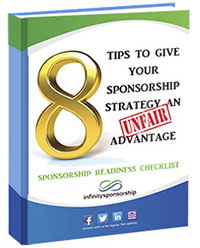Despite all the doom and gloom surrounding the world’s economic climate and how companies seem to be perennially tightening their marketing budgets, did you know that there are coveted benefits that companies look for when they partner in a sponsorship deal?
Can you put your hand on your heart and say with confidence that you know what hits a company’s hot spots when you package and present them with a sponsorship opportunity?
If you are a non-profit organisation, charity or event and you are currently looking for corporate sponsors, or want to get started on a sponsorship strategy, then there are 8 coveted benefits of sponsorship that you need to highlight as part of any opportunity to partner with you.
- Access
Sponsors want access to new and bigger target markets. The more deeply you know your supporter base (the demographics that make up your community of followers) the more compelling you can make your proposition to the right sponsor. The key for you is knowing which companies and brands are trying to sell to your supporters and working out what access you can offer them. TIP: if you are already communicating regularly to your supporters, members or donors through a variety of channels (social media, e-bulletins, magazines, events and so on) the most effective way to give a sponsor access is to help them leverage all the ways you are currently using to connect and inform your community. Remember, it’s not about logo overload. Allow them to make meaningful connections – to educate, inspire and support your followers.
- Exclusivity
Exclusivity can be a powerful proposition for a sponsor. To be the only one in their industry category speaking with your supporters means you are effectively keeping their competitors ‘out of the room’ for them. There are not many marketing opportunities that allow this kind of leverage.
- Connection
As the gate keeper to a community of followers that trust and value your information and advocacy, you can offer sponsors the opportunity to ‘meet your family’ in a warm and safe environment. Non-profit sponsorship should be so much more than advertising – it allows sponsors to dive deep into your community and create long lasting connections with your encouragement and support. By bringing onboard a sponsor, you are saying to your supporters, ‘these are good guys and we want to encourage you to take a closer look at them.’
- Research
Industry-exclusive data – that’s the name of the game for many companies. Some companies go to extraordinary lengths to develop a profile of their ideal customer. For the right brand, you are the gate keeper to a target market they are trying to sell to. Consider offering sponsors the opportunity to add some key marketing questions (ones that they really want the answers to) in your next annual supporter survey or create focus groups with willing supporters. Not currently undertaking a survey of your community of followers? Well… that’s another blog!
- Influence
Sponsorship should provide the opportunity for a brand to impact purchasing behaviour. It may seem heartless, but sponsorship is not philanthropy – a company will not sponsor you just because you are a good cause. Savvy sponsors know that you hold some influence over your supporters – they look to you for guidance, information, resources. (And if they don’t, you need to educate them about your influence!) You could even be a thought leader in your field. The key is to find the right partner – someone that can enhance your supporters’ experience of your organisation of event. It always needs to be a win/win/win scenario for you, your sponsor and your supporters.
- Credibility
Trust is everything! Your supporters are not mandated to be with you. Not many sponsors understand this from the outset. Your supporters trust you – that makes them ‘warm’ leads to a sponsor. You need to sell yourself as the exclusive connection to a target market they want access to. Educate sponsors about the value of your position as the gate keeper – the right brand will understand the power of the perceived ‘endorsement’ that comes from partnering with you.
- Measurement
Let’s get really clear about measurement. It is the job of your sponsor to measure the effective of the relationship. They have outcomes they are seeking to achieve, and they measure every aspect of their marketing and promotions budget to ensure they are on track (or not). You are not in a position to measure against their objectives, and you could never know how many people buy their products, call their hotline, enter their competitions or get on to their website and make a purchase as a result of their sponsorship with you. However, that doesn’t mean that you can’t provide accurate information and regularly report to sponsors on the things that you are doing to promote them to your followers. For instance, it is very helpful to let a sponsor know how many people your last e-bulletin (with their marketing message in it) went out to. You might even track click throughs and open rates – bonus! If you know how many people attended the last event that your sponsor was involved in, it is helpful for them to know that information. If you are not currently providing this kind of measurement and information to sponsors, now is a good time to start.
- Return on Investment
Brands will not invest in a sponsorship opportunity unless they can see an opportunity to gain a return on their investment (ROI). The tricky thing about ROI is that it is difficult to measure, especially when you are dealing with things like ‘changing people’s perceptions’, ‘increasing brand awareness’ and getting ‘greater exposure’. Some companies have an ROI ratio that they work to (4:1 seems a pretty common one) which means that they want to make four times the value of their investment in order to justify the marketing spend. The key for non-profits is to educate sponsors about whose job it is to measure the relationship and not to use those measurement tools to simply justify expenditure. You have a key role in this process by being able to establish initial benchmarks across your supporter base (surveys, focus groups and so on) that can tell a sponsor how well their brand is perceived and liked amongst your community that can then be retested after a period of time to track changes in perceptions and behaviour.
As a non-profit organisation you may feel that you are continually forced to play the poor charity partner in need of a handout, when really your worth as a valuable marketing partner is immense to the right brand!
Heed these coveted benefits of sponsorship, look more closely at how you can highlight them in your approach and play to your strengths the next time you seek a partnership.





